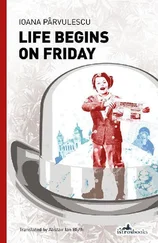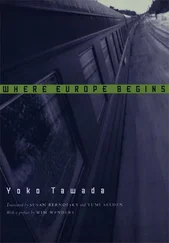He doesn’t follow me, Stella says. He harasses me; there’s a difference. I’d like him to stop. I can’t stand it any more.
Then you have to tell him that; the bicycle mechanic looks at Stella impassively; he seems to be wondering which side he’d be on if someone were to ask him. It’s obvious he isn’t necessarily Mister Pfister’s friend, but he seems to like him.
Tell him that. If you’ve never spoken to him, then maybe you ought to do it sometime. Tell him, talk to him. One can talk to him; I’m sure one can.
Oh, Stella says. Can one?
This suggestion is the opposite of Jason’s advice. The opposite of Clara’s advice, all the advice in the goddamn miserable network. But Stella senses that she’s going to listen to this suggestion. What would Jason and Clara say? And what would they say about her even sitting here.
But after all she isn’t sitting here secretly. Jason can walk by the house; Mister Pfister can walk by the house; anybody can.
Let’s move to another spot, the bicycle mechanic says, move into the warm setting sun.
He takes his cup off the table and pours the rest of the tea into the grass with a conclusive or preparatory gesture.
Yes, Stella says. With pleasure.
Could I go through the house? Through the hall and the kitchen, out the back; I’d like to see what your house looks like. Compared to mine.
Of course, the bicycle mechanic says. Of course you can.
He gets up before she does and goes in ahead of her.
These days Esther does everything by herself. When Stella arrives, she’s already sitting in the kitchen. She has dressed herself, straightened her bed, put her medication, glasses, pencils, crossword puzzles and newspaper on the tray of her walker and set off. She has closed the kitchen door, which at other times is left wide open, behind her; Stella assumes this is supposed to mean something, but can’t imagine what. Esther is sitting at the kitchen table and has the radio on very loud. She’s listening to a classical music concert and raises her hand in warning when Stella enters the kitchen. In spite of that Stella starts to unpack her purchases, wash the dishes, sweep up. You have no idea, Esther says; it’s really astonishing that you don’t have the slightest inkling about anything.
She inclines her head to the radio and conducts an invisible orchestra with skilful little gestures. Pa-ti-ta. Pa-ti-ta. Pa-ti — listen, now here they are. The mermaids. Esther shakes her head and gestures as if Stella had said something, then she turns the radio off and bends over the television listings, and with angry strokes checks all the programmes she wants to watch, that she considers worthwhile.
I can take care of myself. Please make me some toast with orange marmalade since you’re sneaking around here anyway, and sweep the room, the dust balls are as big as a child’s head; I wonder where you learned to keep house. You’re pale. You should change your hairstyle. You ought to see more people; I think I’m the only person you have anything to do with.
Stella empties the commode, the washbowl, the mug with Esther’s stringy spit, she rinses the mug at the sink in the bathroom looking elsewhere, certainly not in the mirror. She vacuums, piles up the old newspapers; she’s brought along flowers, irises and roses, and she arranges them carefully in Esther’s glass vase; she listens to Esther’s monologues and thinks there is a kernel of truth in what Esther’s going on about. Esther is not well liked. Stella puts the books Esther has dropped behind the bed over the weekend back on the shelf. Volumes of poetry, short stories, dream interpretations. She wipes off the shelf and arranges the photos of Esther’s children and grandchildren again; it’s sad to see how many people Esther has lived with, and how alone she now is. Get down to business, Esther calls from the kitchen. Get a move on! She doesn’t specify what business, what move she’s referring to.
Stella sits down at the table with Esther; cuts the toast into small pieces, says, Esther, be sensible. Let me get at your ear to measure your blood sugar. Esther turns and with the expression of an offended child that knows better, holds her left ear to Stella. Stella squeezes a drop of blood from the soft, delicate earlobe. Your sugar is too high, Esther; and then she watches as Esther confidently lifts her shirt and injects insulin into her swollen abdomen. She records Esther’s numbers in the record book; they sit together peacefully. Stella has the clear sense that Esther is glad she is there, even though she would never say so. In suspiciously good shape, the night nurse had written into the record book, conspicuously lively. Stella knows what that means; increased vitality is often followed by illness, a fall or an accident.
Close that awful book, Esther says sternly. Leave now. There’s a fresh wind blowing here, I can feel it, and the two of us, you and I, we won’t be seeing much of each other any more. How is your child?
She’s well, Stella says. She’s doing well. Last week she lost both of her front teeth at the same time; she looks like a little vampire.
Aha. Esther smiles vaguely. She says, I think you’ll be leaving us, or am I mistaken. You’ll put a nice letter of resignation on Paloma’s desk, that’s what you’ll do. Am I wrong.
No, Stella says. She says, I don’t know.
Well, Esther says, this is a dead corner. A dead corner of the world. I don’t remember any more what brought me here, how in God’s name I ever came to be here.
Stella ponders this as she gets on her bicycle outside Esther’s house. She could have said, Same here. I don’t remember either what brought me here, how I got here.
In the dim summery light the gardens disappear, the ordinary streets suddenly look completely foreign to her; something is changing, has already changed.
*
Recently, Stella writes to Clara, I’ve been having the same dreams I had when I was a child. I dream about the doll’s house that stood in my nursery and a tiny little being, which I know is evil, flits through the night-time doll’s house. It hides in the doll’s house; it’s not to be found, but I know it’s there; it’s in my house. What does this mean? I’m writing you this letter sitting in the garden, it’s already almost dark; I can’t see what I put down on the paper, and I don’t have any words either, not a single little word for my longing for Jason, that feels so final, as if he were dead. But he isn’t dead. He’ll come back again tomorrow, and three beers and a bowl of plums are waiting for him in the refrigerator. Do you still remember how full of confidence we were ten years ago? Almost reckless. And yet it was all about nothing. What we wanted is what we have — a husband, child, a roof over our head, a self-contained life. It’s going to rain soon; you can feel it before it really starts to rain; it’s something electric, it’s in the air. Clara, Take care. As ever your —
*
Heat hangs over the city; at night the horizon doesn’t turn black any more, but glows ominously and threateningly orange from under a bank of clouds. Contrary to Paloma’s pronouncement no one dies, but the nursing shifts are arduous and exhausting. Stella accompanies Walter to the hospital. Walter’s catheter has to be exchanged; he has to have his bowel irrigated and then undergo a colonoscopy. He’ll have to stay in the hospital for one long, hot week, and Stella doesn’t know whether Walter knows that his family is coming this week to talk to Paloma; his sisters and his brother. Possibly they’ll take him to a nursing home, clean out and sell his house; how do you transport those fragile cardboard models of bridges, and will it even matter to anyone. Who will take care of the canaries. Could the canaries, if they were freed, survive in the suburban gardens? Stella sits next to Walter in the ambulette. Walter is buckled into his wheelchair; the windows of the ambulette are made of frosted glass, they can’t be opened; it’s impossible to find out what section of town they’re in, where they are. Walter can’t even look out of the window, now that he is actually being driven through the city. Ava would break out in tears at this injustice. There’s a traffic jam. The tinted glass pane separating them from the driver’s compartment is closed, and Stella and Walter watch the inaudible conversation of the drivers, which is apparently about all those things that have always been and will never change, a choreography of gestures and head shaking. They are stuck in the traffic jam. Walter closes his eyes. He turns his face to Stella as if for a very last look, a face from the series of sleepers hanging above his bed. What is Walter dreaming about. Stella knows so much about him and yet so little. She looks at him. In a sickly way he is carefully shaved and his eyelids are wrinkled; the eyelashes are thick as a child’s. He opens his eyes again as if Stella had seen enough. He says, Thirsty, and Stella lifts up the cup and puts the straw between his lips, wipes the water from his chin with a cloth, and puts the cup down again. She says, Is that enough. Walter doesn’t answer. The driver brakes, finally stops, and turns off the engine. Stella sees from Walter’s smile that he doesn’t care, that there’s no connection between things anyway.
Читать дальше












